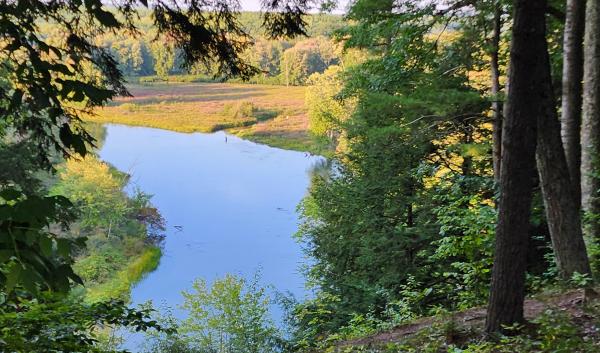Diverse actions can address climate change in urban forest management while recognizing the fundamentally interconnected nature of human health and wellbeing.
Urban areas can be particularly vulnerable to climate change due to extensive impervious cover, increased pollution, greater human population densities, and a concentration of built structures that intensify impacts from urban heat, drought, and extreme weather. Urban residents are at risk from a variety of climate stressors, which can cause both physical and mental harm.
Urban forests and tree cover provide a critical role in helping cities address climate change by supporting greenhouse gas mitigation, reducing the impacts of extreme heat and altered climate that impair human health, and helping communities to adaptively respond through engagement with nature. At the same time, urban forests are vulnerable to changes in climate and in need of robust strategies to adapt to those changes.
Effects from Climate Change
Climate change will affect urban areas as they experience:
- Warmer temperatures and more days with extreme heat
- Fewer days with extreme cold
- Altered precipitation creating wetter conditions in some seasons
- More frequent heavy precipitation events
- Elevated risk of drought or aridification
- Increases in carbon dioxide, a greenhouse gas

Adaptation in Action
The Urban Forests and Human Health Adaptation Menu presents information and ideas for optimizing the climate and human health outcomes of urban forestry projects and provides professionals who are working at the intersection of climate, public health, and urban forestry with resources to support climate adaptation planning and activities.
This menu synthesizes adaptation actions to address climate change in urban forest management and promote human health and wellbeing through nature-based solutions. It compiles and organizes information from a wide range of peer-reviewed research and evidence-based reports on climate change adaptation, urban forest management, carbon sequestration and storage, and human health response to urban nature.
The Urban Forests and Human Health Adaptation menu is designed to be used as a stand-alone resource, and it can also be used to supplement structured adaptation planning with the Adaptation Workbook process (published in Forest Adaptation Resources: Climate Change Tools and Approaches for Land Managers).

Strategies and approaches
The 9 strategies, 34 approaches, and 100+ example tactics were developed through an assessment of existing adaptation tools, focus group discussions, and workshops with natural resource professionals.
Adaptation strategies are very general and can be applied in many ways across different ecosystems and cultural contexts. Adaptation approaches are more specific, describing in greater detail how strategies could be put into practice.
These strategies and approaches are designed to serve as stepping stones to allow natural resource managers and planners to translate broad concepts into targeted and specific actions (tactics) for putting climate change adaptation into practice to achieve a specific management objective in a specific location.
Example tactics are provided in the menu as illustrations of a few of the possible actions that could implemented for climate adaptation.
Climate Adaptation Strategies for Urban Forests & Human Health
-
Approach 1.1: Address socio-ecological systems in early, comprehensive response.
Approach 1.2: Integrate urban forestry in climate planning and policy.
Approach 1.3: Address climate and health challenges of disadvantaged communities and vulnerable populations.
-
Approach 2.1: Reduce extreme temperatures and heat exposure.
Approach 2.2: Improve urban air quality conditions.
Approach 2.3: Anticipate and reduce human health impacts of hazardous weather and disturbance events.
-
Approach 3.1: Minimize forest loss and degradation.
Approach 3.2: Maintain existing trees through proper care and maintenance.
Approach 3.3: Restore and increase tree, forest, and vegetative cover.
Approach 3.4: Sustain sites and ecosystems that provide high value across the landscape.
-
Approach 4.1: Maintain or restore soils and nutrient cycling in urban areas.
Approach 4.2: Maintain or restore hydrologic processes in urban forests.
Approach 4.3: Restore or maintain fire in fire-adapted ecosystems.
-
Approach 5.1: Reduce impacts from extreme rainfall and enhance water infiltration and storage.
Approach 5.2: Reduce risk of damage from extreme storms and wind.
Approach 5.3: Reduce risk of damage from wildfire.
Approach 5.4: Maintain or improve the ability of forests to resist pests and pathogens.
Approach 5.5: Prevent invasive plant establishment and remove existing invasive species.
Approach 5.6: Manage herbivory to promote regeneration, growth, and form of desired species.
-
Approach 6.1: Enhance age class and structural diversity in forests.
Approach 6.2: Maintain or enhance diversity of native species.
Approach 6.3: Optimize and diversify tree species selection for multiple long-term benefits.
Approach 6.4: Maintain or enhance genetic diversity.
-
Approach 7.1: Favor or restore non-invasive species that are expected to be adapted to future conditions.
Approach 7.2: Establish or encourage new species mixes.
Approach 7.3: Introduce species, genotypes, and cultivars that are expected to be adapted to future conditions.
Approach 7.4: Disfavor species that are distinctly maladapted.
Approach 7.5: Move at-risk species to more suitable locations.
Approach 7.6: Promptly revegetate and remediate sites after disturbance.
Approach 7.7: Realign severely altered systems toward future conditions.
-
Approach 8.1: Provide nature experiences to ease stress and support mental function.
Approach 8.2: Encourage community and social cohesion to support climate response.
-
Approach 9.1: Co-design large-scale green infrastructure and built systems to promote health.
Approach 9.2: Provide micro-scale nature experiences to promote health and healing.
Citation
Janowiak, Maria K.; Brandt, Leslie A.; Wolf, Kathleen L.; Brady, Mattison; Darling, Lindsay; Lewis, Abigail Derby; Fahey, Robert T.; Giesting, Kristen; Hall, Eboni; Henry, Molly; Hughes, Maise; Miesbauer, Jason W.; Marcinkowski, Kailey; Ontl, Todd; Rutledge, Annamarie; Scott, Lydia; Swanston, Christopher W. 2021. Climate adaptation actions for urban forests and human health. Gen. Tech. Rep. NRS-203. Madison, WI: U.S. Department of Agriculture, Forest Service, Northern Research Station. 115 p. https://doi.org/10.2737/NRS-GTR-203
Acknowledgements
The Northern Institute for Applied Climate Science and regional partners led the development of the urban forest adaptation strategies and approaches, which can be used with the Adaptation Workbook process (published in Forest Adaptation Resources: Climate Change Tools and Approaches for Land Managers). The Northern Institute of Applied Climate Science (NIACS) a collaborative, multi-institutional partnership led and supported by the USDA Forest Service.



